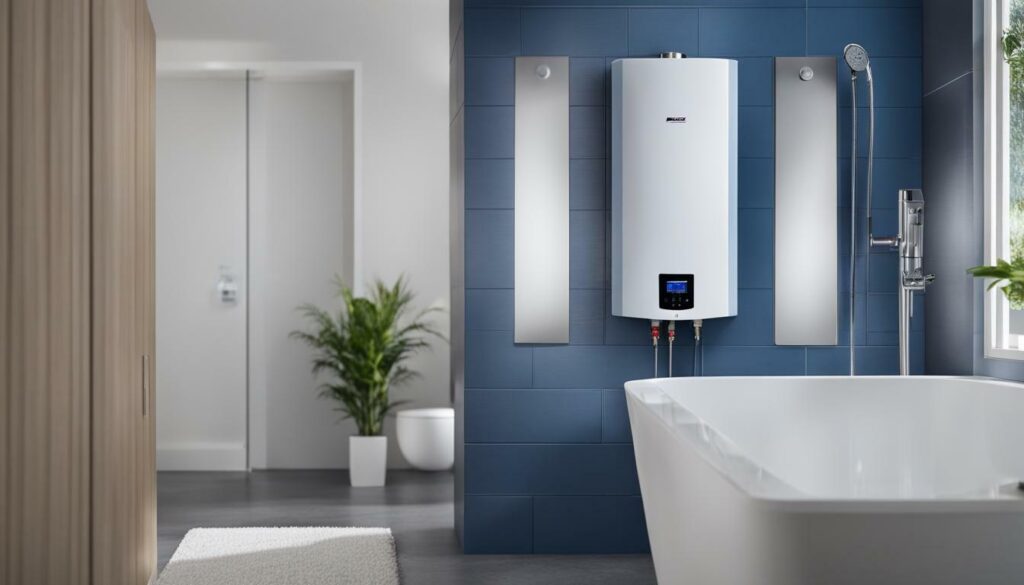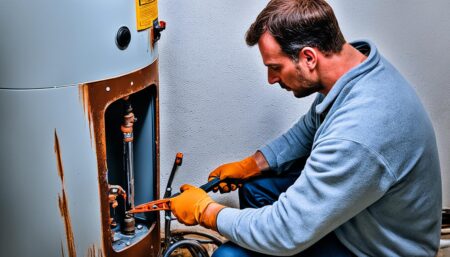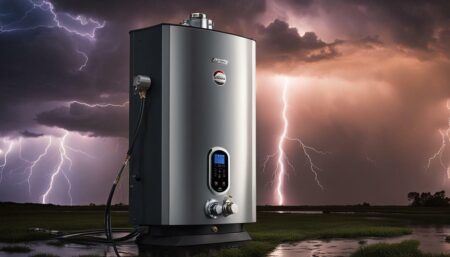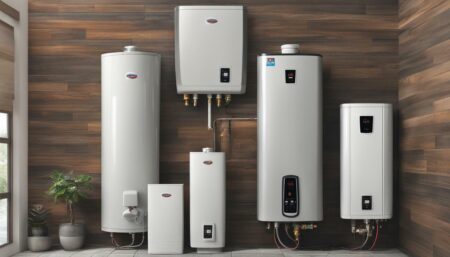Welcome to our comprehensive guide to electric tankless water heaters and the important considerations regarding water quality. As homeowners increasingly seek ways to reduce energy bills and save space, electric tankless water heaters have become an increasingly popular option. But did you know that water quality can greatly impact their performance and longevity?
From water hardness and contaminants to filtration systems and water testing, we will help you make informed decisions to ensure that your electric tankless water heater runs smoothly while providing clean, safe, and reliable hot water for your household.
- Electric tankless water heaters are an energy-efficient option that can help homeowners reduce energy bills and save space.
- Water quality plays a crucial role in the performance and longevity of electric tankless water heaters.
- Water hardness and contaminants can cause mineral buildup, scale formation, and reduce appliance efficiency.
- Investing in a water filtration system and utilizing appropriate water treatment and purification methods can greatly enhance water quality and protect your electric tankless water heater from damage.
- Regular water testing is essential to monitor water quality and identify any potential issues that may impact appliance performance.
Understanding Electric Tankless Water Heaters
If you’re tired of running out of hot water or are looking for a more energy-efficient option, you may want to consider an electric tankless water heater. Unlike traditional tank water heaters that store and heat water around the clock, tankless water heaters heat water on demand. This feature makes them more energy-efficient, saving you money on your utility bills.
Electric tankless water heaters are a popular option for homeowners. They are cost-effective, easy to install, and require less maintenance than gas-powered models. These appliances are also more compact, making them ideal for smaller homes or spaces.
When it comes to functionality, electric tankless water heaters work by using electric heating elements to heat water as it passes through the unit, providing you with hot water on demand. They are designed to supply continuous hot water, ensuring you never run out of hot water again.
Compared to traditional tank water heaters, electric tankless water heaters have a longer lifespan and can last up to 20 years with proper maintenance. They also take up less space, making them an ideal option for those with smaller homes or limited storage space.
When it comes to installation, electric tankless water heaters require a dedicated electric circuit to supply power. They also need to be installed close to your fixtures to minimize wait time for hot water. Hiring a professional plumber is recommended for proper installation and to ensure compliance with local codes and regulations.
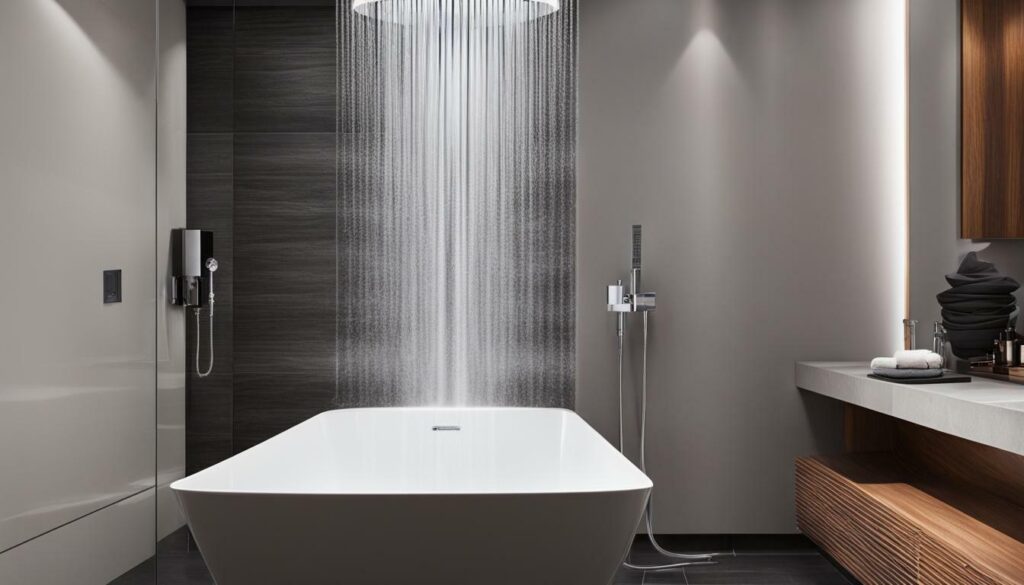
To summarize, electric tankless water heaters are an energy-efficient and cost-effective option for homeowners looking for continuous hot water without the need for a storage tank. They’re easy to install, require less maintenance, and have a longer lifespan compared to traditional tank water heaters. When installed properly, they can provide hot water on demand for years to come.
The Importance of Water Quality Considerations
When it comes to electric tankless water heaters, water quality is of the utmost importance. Poor water quality can lead to decreased performance and damage to your appliance. Therefore, it is crucial to consider the following water quality factors to ensure optimal performance and longevity of your electric tankless water heater:
- Water hardness
- Presence of contaminants
- Water filtration systems
- Water treatment and purification methods
- Regular water testing
These considerations can have a significant impact on the efficiency and durability of electric tankless water heaters. Let’s dive deeper into each of these factors.
The Impact of Water Hardness
Water hardness refers to the presence of minerals, primarily calcium and magnesium, in your tap water. Hard water can significantly impact the performance of your electric tankless water heater by causing mineral buildup and scale formation. These issues can decrease the efficiency of your appliance, resulting in increased energy consumption and higher utility bills. Therefore, it is essential to evaluate the hardness of your water and take appropriate measures to mitigate its effects.
The Presence of Contaminants
Contaminants such as sediment, chlorine, and heavy metals can also affect the quality of your water and your electric tankless water heater’s performance. These contaminants can cause damage to your appliance and reduce the lifespan of your unit. Therefore, it is essential to identify the sources of contamination and invest in appropriate filtration systems or treatment methods to ensure clean and safe water.
Water Filtration Systems
Water filtration systems are an effective solution to enhance water quality and protect your electric tankless water heater from potential damage. Various filtration systems are available, including carbon filters, reverse osmosis systems, and water softeners. These systems can remove contaminants and minerals, improving the quality of your water and the performance of your appliance.
Water Treatment and Purification Methods
In addition to filtration, water treatment and purification methods can be employed to remove specific contaminants and enhance water quality. These methods include water softeners, reverse osmosis, and UV sterilization. Treatment and purification methods can be used in conjunction with filtration systems to ensure maximum water quality.
Regular Water Testing
Regular water testing is essential to monitor the quality of your water and identify any potential issues that may impact your electric tankless water heater’s performance. Testing can help detect the presence of contaminants, identify the level of water hardness, and determine the effectiveness of any filtration or treatment methods in use.
Water hardness is a significant consideration when it comes to electric tankless water heaters. Hard water contains high levels of minerals such as calcium and magnesium, which can lead to mineral buildup, scale formation, and reduced efficiency in your electric tankless water heater. This buildup can also lead to more frequent maintenance and replacement needs.
One way to determine your water hardness is to have a water test performed, which can be done by a professional or with a DIY kit. The test results will help determine the appropriate solution to mitigate the effects of hard water on your electric tankless water heater.
| Water Hardness Level | mg/L or ppm | Classification |
|---|---|---|
| Soft | 0-60 | Not a concern for electric tankless water heaters |
| Moderately Hard | 61-120 | Minimal impact on electric tankless water heaters |
| Hard | 121-180 | Potentially harmful to electric tankless water heaters |
| Very Hard | Above 180 | Critical concern for electric tankless water heaters |
If your water is classified as hard or very hard, there are several solutions available to minimize the impact on your electric tankless water heater. These include water softeners, which remove minerals through a process of ion exchange, or descalers, which use technology to break down minerals and prevent buildup. Another option is to install a water conditioner, which uses a catalytic process to change the structure of minerals in the water, making them less prone to sticking to surfaces.
By addressing water hardness, you can ensure optimal performance and longevity of your electric tankless water heater. With the right solution, you can enjoy clean, safe, and reliable hot water for years to come.
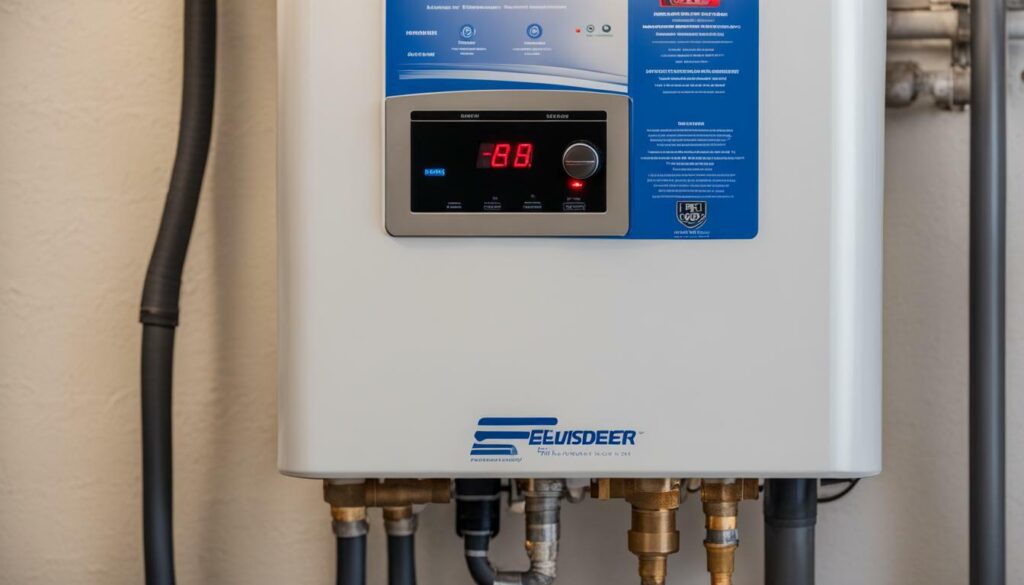
Water contaminants can pose a significant threat to both your health and your electric tankless water heater’s performance. Sediment, chlorine, and heavy metals are some common contaminants that can affect your water quality and your appliance’s efficiency.
These contaminants can cause clogging, scaling, and even corrosion in your water heater, leading to reduced performance and potentially costly repairs. It is essential to take steps to mitigate these potential hazards and ensure safe, clean water for your home.
“The presence of contaminants in your water can not only affect the performance of your electric tankless water heater but also pose a health risk to you and your family.”
One way to tackle water contaminants is by installing a whole-house filtration system. These systems are designed to remove impurities from your water, providing filtered water throughout your home. Depending on your specific needs, you can choose filtration systems that target specific contaminants or opt for a system that provides a broad-spectrum filter.
Another option is to install point-of-use filters, which are installed at specific water outlets, such as your kitchen sink or showerhead. These filters are a more affordable and convenient alternative to whole-house filter systems, but they only serve a limited area.
It is also essential to regularly maintain these filters and replace them when necessary to ensure their effectiveness.
In addition to filtration, water treatment and purification methods can also be employed to remove specific contaminants and enhance water quality. Water softeners, reverse osmosis, and UV sterilization are some methods you can consider to protect your electric tankless water heater and ensure clean, safe water for your home.
By taking proactive measures to address water contaminants, you can improve your water quality and extend the life of your electric tankless water heater.
Enhancing Water Quality with Filtration Systems
Investing in a reliable water filtration system is an effective way to ensure clean and safe water for your household while also protecting your electric tankless water heater from potential damage. Different types of filtration systems are available in the market, each with its specific features and benefits. It is essential to choose a filtration system that meets your needs and matches your water quality requirements.
One of the most common filtration systems used with electric tankless water heaters is the sediment filter. Sediment filters are designed to remove impurities such as sand, particles, and debris that could clog the unit and cause damage in the long run. Sediment filters are available in different sizes and can be customized to fit your specific water flow and pressure requirements.
Another effective filtration system is the activated carbon filter. Activated carbon filters use a process called adsorption to remove impurities such as chlorine, volatile organic compounds (VOCs), and other chemicals that can affect water quality and taste. Activated carbon filters are easy to install and require minimal maintenance, making them a popular choice among homeowners.
Reverse osmosis (RO) systems are an advanced type of filtration system that can remove up to 99% of dissolved solids, bacteria, and other contaminants from water. RO systems work by forcing water through a semi-permeable membrane that traps the impurities and allows clean water to pass through. RO systems are effective for removing dissolved solids such as calcium and magnesium that cause hard water buildup in electric tankless water heaters.
Finally, Ultraviolet (UV) sterilization systems are specifically designed to kill bacteria, viruses, and other microorganisms that can contaminate your water supply. UV sterilization works by exposing water to high-intensity UV light, which destroys the DNA of microorganisms and prevents them from reproducing. UV sterilization is a chemical-free and eco-friendly option for enhancing water quality and protecting your electric tankless water heater from potential damage.
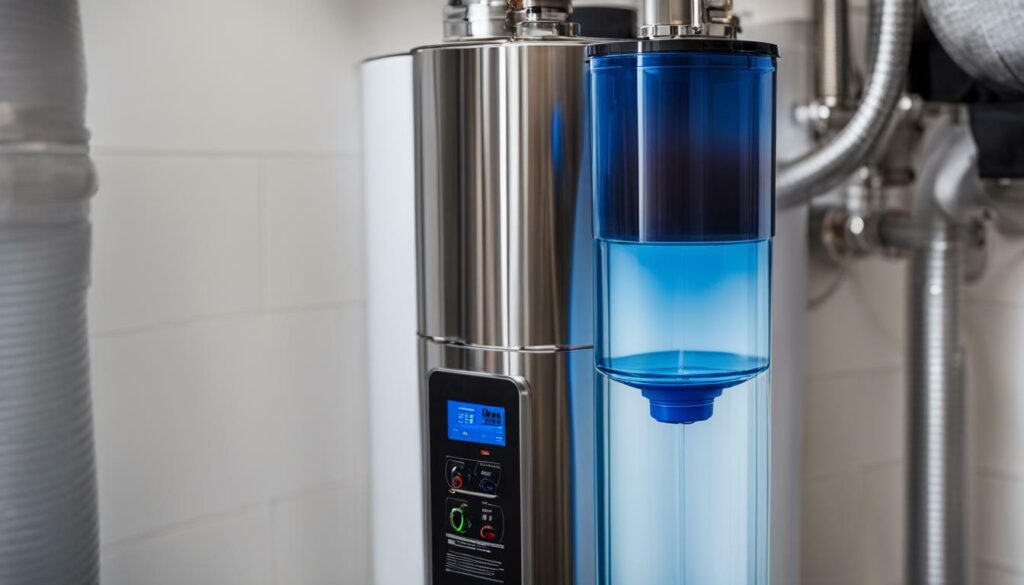
Water Treatment and Purification Methods
While water filtration systems can effectively remove many contaminants, there are some pollutants that may require additional treatment and purification methods. Two popular options for water treatment and purification are water softeners and reverse osmosis systems.
Water softeners are used to reduce water hardness by removing minerals such as magnesium and calcium, which can cause scaling and buildup in your electric tankless water heater. These systems work by exchanging these minerals with sodium ions through a process called ion exchange. While this can improve the taste and texture of your water, it’s important to note that the increased sodium levels may not be suitable for those on low-sodium diets.
Reverse osmosis systems, on the other hand, utilize a semi-permeable membrane to remove impurities such as lead, arsenic, nitrates, and other chemicals. These systems work by applying pressure to force water through the membrane, leaving behind contaminants that are then flushed away. The result is clean and purified water that is safe for consumption and optimal for use in your electric tankless water heater.
Other water purification methods include UV sterilization, distillation, and activated carbon filtration. Each method may be more or less effective depending on the specific contaminants present in your water, so it’s important to choose a system that is right for your needs.
The Significance of Water Testing
Regular water testing is crucial to ensure that your electric tankless water heater operates at optimal levels and that your family has access to clean and safe water. There are several testing methods available, including at-home test kits and professional lab testing.
At-home test kits are relatively inexpensive and easy to use. They typically involve collecting a water sample and using a test strip or vial to check for specific contaminants such as pH levels, chlorine, and hardness. For more comprehensive testing, professional lab testing can provide detailed results, including information on heavy metals, bacteria, and other harmful substances that may be present in your water.
Interpreting the results of water testing requires some knowledge of water quality and the specific needs of your electric tankless water heater. For example, if your water has high levels of hardness or mineral content, you may need to consider a water softener to prevent mineral buildup inside the appliance. Alternatively, if there are contaminants such as bacteria or harmful chemicals present in your water, you may need to install a filtration or purification system to remove them.
Regular water testing can also help you monitor changes in your water quality over time. For example, if you notice a sudden increase in the hardness of your water, this may indicate an issue with your water source or a problem with your electric tankless water heater. By identifying these issues early on, you can take corrective action to prevent damage to your appliance and ensure that your family has access to clean and safe water.
Choosing the Best Electric Tankless Water Heater for Your Needs
Now that we have explored the impact of water quality on electric tankless water heaters, let’s focus on selecting the right appliance for your household. There are several factors to consider, including:
- Flow rate: The flow rate refers to the amount of hot water the appliance can produce per minute. Consider your household’s hot water needs and choose an electric tankless water heater with an appropriate flow rate.
- Temperature rise: The temperature rise is the difference between the temperature of the incoming water and the desired output temperature. Consider the climate in your area and select an electric tankless water heater with a suitable temperature rise.
- Size: Electric tankless water heaters are available in various sizes. Choose a size that suits your household’s hot water needs and the available installation space.
- Energy efficiency: Look for an electric tankless water heater with a high energy efficiency rating to save on your monthly utility bills and reduce your carbon footprint.
- Warranty: Ensure the appliance comes with a warranty that covers necessary repairs or replacements in case of defects or malfunctions.
By considering these factors, you can ensure that you select the best electric tankless water heater for your needs. It’s important to note that professional installation is usually required for electric tankless water heaters to ensure optimal performance and safety.
Choose an appliance that fits your household’s hot water needs, water quality, and budget to ensure clean, safe, and reliable hot water for years to come.
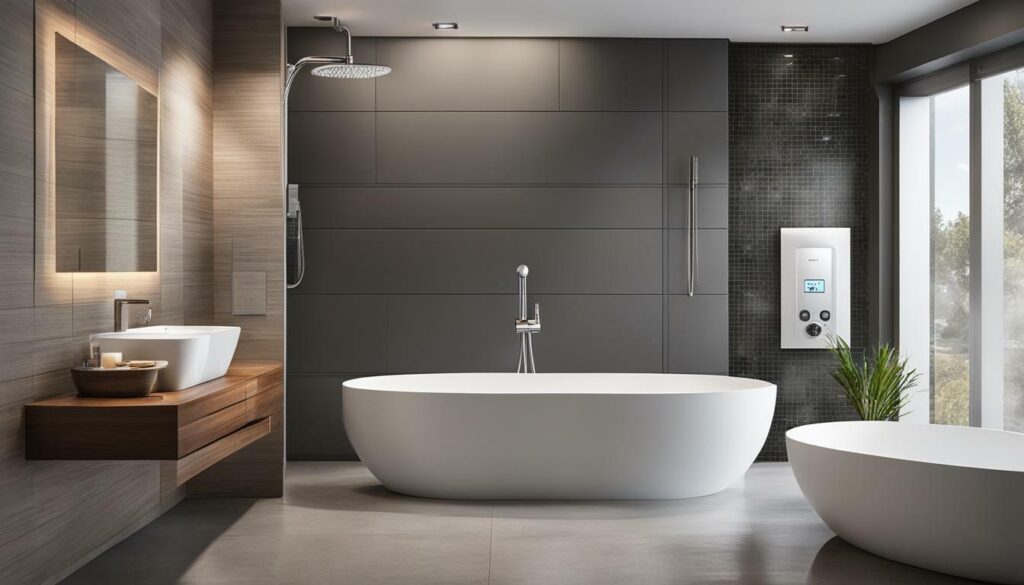
In conclusion, investing in an electric tankless water heater comes with many benefits, including energy efficiency and a continuous supply of hot water. However, it’s equally important to consider water quality considerations to ensure optimal appliance performance and longevity.
By evaluating water hardness, identifying and dealing with water contaminants, and enhancing water quality with filtration systems and purification methods, you can safeguard your electric tankless water heater and enjoy clean, safe, and reliable hot water for years to come.
Don’t forget the importance of regular water testing to monitor the quality of your water and ensure your appliance is functioning at its best. With these considerations in mind, you can confidently choose the best electric tankless water heater for your household needs and enjoy the many benefits it has to offer.



